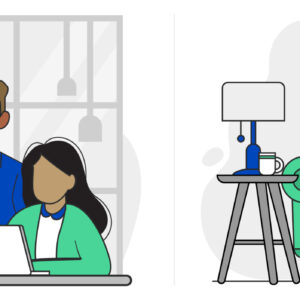Six Rules to Help Keep Your Kids Safe Online
Last Updated on August 16, 2021 by Bennett Floyd
6 Ways to Protect Your Kids Online
Talking with your kids about what to do and what to avoid online is an important way to help protect them. Nearly 60 percent of teen Internet users say their parents have the greatest influence on their opinions about appropriate and inappropriate online behavior, and your influence can keep them safe.
Ask your kids open-ended questions about their online activity and let them know you’re available to help them navigate any difficult situations they encounter. Then, to help them gain a better understanding of online risks — and how they can protect themselves — share these six rules for Internet safety.
-
Create strong passwords.
Your child will likely have multiple social media accounts, so make sure they have passwords that are difficult to break. An expert hacker can crack the average password in less than three minutes. Because roughly one-third of people use the same password for every site, your child could have multiple sites breached at once.
If your family needs help remembering passwords, don’t write them down or save them on your computer. Instead, use a password management tool like LastPass, which stores all of your passwords securely. Remind your kids not to share their passwords with anyone, and to always sign out of their online accounts — especially when using a public or school computer.
-
Don’t share identifying information.
A Carnegie Mellon CyLab study found that children are 51 times more likely to be victims of identity theft than their parents. There are two primary reasons kids are more often victimized by identity thieves. First, they’re easier targets because they tend to be more careless about posting sensitive information online. Second, they have unblemished credit records that identity thieves can exploit to the fullest.
Unfortunately, many children don’t find out they’re victims of identity theft until they apply for student loans, credit cards, or a job. The ramifications of identity theft are extensive, so have a heart-to-heart talk with your child about information they should never share online.
-
Don’t broadcast your location.
According to the Journal of Adolescent Health, one-quarter of online sexual offenders used social networking profiles to discover where their victim was located at a specific time. Furthermore, research shows that nearly half of online youth leave their GPS services on at all times.
Explain to your children that GPS technology can be helpful, but it can also be dangerous. Caution them to use the GPS service on their devices carefully, and ensure that they activate the privacy settings on their social media networks.
-
Caution against social media scams.
More than 600,000 Facebook accounts are compromised daily, and 10 percent of social media users say they’ve fallen victim to a cyber attack through a social network platform. According to Symantec Corporation’s 2014 Internet Security Threat Report, the most common scams on Facebook are fake offers and online surveys.
Tell your kids to avoid these offers, and help them watch out for other types of social networking scams such as like-jacking and phishing. To like-jack, criminals post fake Facebook “like” buttons to webpages. When their victim clicks the button, malware automatically downloads to their device. Phishing takes place when a seemingly trustworthy person or entity attempts to acquire sensitive information like credit card numbers, usernames, and passwords.
-
Use antivirus software.
According to a Microsoft Security Intelligence Report, computers without antivirus software are an average of 5.5 times more likely to be attacked than those with up-to-date security software. Explain to your kids that antivirus software is the first line of defense against hackers as it helps detect, prevent, and remove worms, viruses, and other malicious programs.
To further enhance your home Internet security, it is ideal to keep your firewalls turned on, installing anti-spyware technology, and ensuring your computer’s operating system is up to date. Get your family in the habit of turning off web-enabled devices when they’re not in use — hackers have an easier time when people leave Wi-Fi and Bluetooth on.
-
Check your online reputation regularly.
A Kaplan survey found that 40 percent of college admissions officers view their college applicants’ social media profiles. An unsavory online reputation can have many repercussions, so remind your children to think carefully about what they post. Images of underage drinking, membership in controversial organizations, and foul or derogatory language are just a few things that can damage their reputation.
To find out what information is online about your child, sit down with them and run their name through an online search engine. Set up a Google alert to receive email updates when their name is mentioned online, and consider using the app Clear. Clear connects with your child’s Facebook, Instagram, and Twitter accounts to flags posts and pictures that may be inappropriate.
Helping your kids stay safe on the Internet is an ongoing process. Keep an open dialogue and readdress these rules with your children as they mature and technology evolves.
If you’re looking for high-speed Internet, CenturyLink has options that include additional safety features for you home network. Plus, you have the opportunity to save additional money through Internet and Home service bundles. Not to mention, you can keep looking through these free resources to find additional safety tips on how to protect your household while you’re connected to the web.







